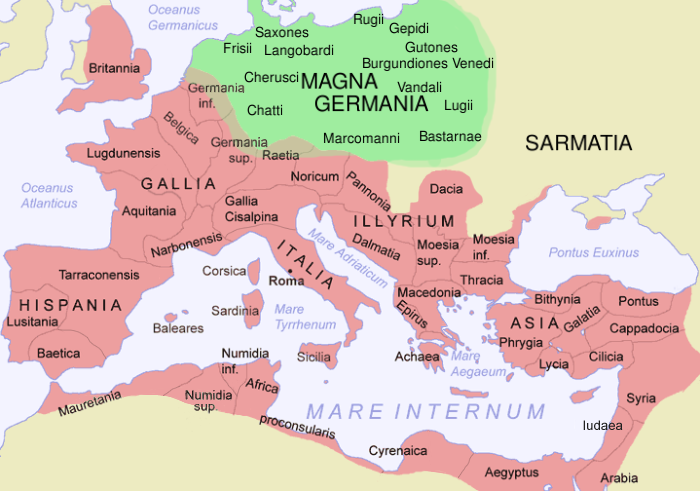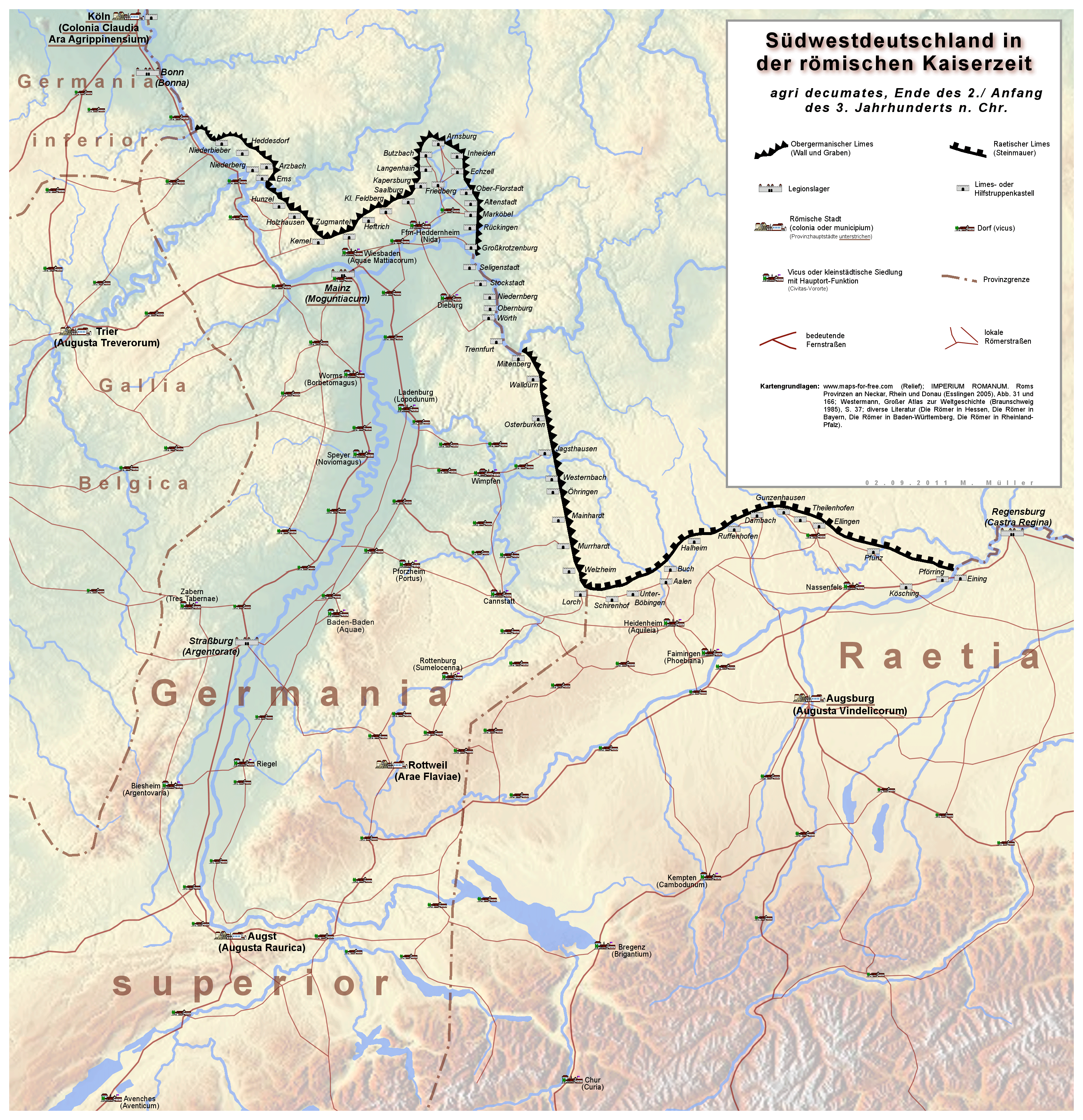Agri decumates on:
[Wikipedia]
[Google]
[Amazon]



 The ''Agri Decumates'' or ''Decumates Agri'' ("Decumatian Fields") were a region of the
The ''Agri Decumates'' or ''Decumates Agri'' ("Decumatian Fields") were a region of the
However, the later geographer



 The ''Agri Decumates'' or ''Decumates Agri'' ("Decumatian Fields") were a region of the
The ''Agri Decumates'' or ''Decumates Agri'' ("Decumatian Fields") were a region of the Roman Empire
The Roman Empire ( la, Imperium Romanum ; grc-gre, Βασιλεία τῶν Ῥωμαίων, Basileía tôn Rhōmaíōn) was the post-Roman Republic, Republican period of ancient Rome. As a polity, it included large territorial holdings aro ...
's provinces of Germania Superior
Germania Superior ("Upper Germania") was an imperial province of the Roman Empire. It comprised an area of today's western Switzerland, the French Jura and Alsace regions, and southwestern Germany. Important cities were Besançon ('' Vesontio ...
and Raetia
Raetia ( ; ; also spelled Rhaetia) was a province of the Roman Empire, named after the Rhaetian people. It bordered on the west with the country of the Helvetii, on the east with Noricum, on the north with Vindelicia, on the south-west ...
, covering the Black Forest
The Black Forest (german: Schwarzwald ) is a large forested mountain range in the state of Baden-Württemberg in southwest Germany, bounded by the Rhine Valley to the west and south and close to the borders with France and Switzerland. It is ...
, Swabian Jura
The Swabian Jura (german: Schwäbische Alb , more rarely ), sometimes also named Swabian Alps in English, is a mountain range in Baden-Württemberg, Germany, extending from southwest to northeast and in width. It is named after the region of ...
, and Franconian Jura
The Franconian Jura ( , , or ) is an upland in Franconia, Bavaria, Germany. Located between two rivers, the Danube in the south and the Main in the north, its peaks reach elevations of up to and it has an area of some 7053.8 km2. Emil Meyn ...
areas between the Rhine
), Surselva, Graubünden, Switzerland
, source1_coordinates=
, source1_elevation =
, source2 = Rein Posteriur/Hinterrhein
, source2_location = Paradies Glacier, Graubünden, Switzerland
, source2_coordinates=
, source ...
, Main, and Danube
The Danube ( ; ) is a river that was once a long-standing frontier of the Roman Empire and today connects 10 European countries, running through their territories or being a border. Originating in Germany, the Danube flows southeast for , pa ...
rivers, in present southwestern Germany
Germany,, officially the Federal Republic of Germany, is a country in Central Europe. It is the second most populous country in Europe after Russia, and the most populous member state of the European Union. Germany is situated betwee ...
, including present Frankfurt
Frankfurt, officially Frankfurt am Main (; Hessian: , " Frank ford on the Main"), is the most populous city in the German state of Hesse. Its 791,000 inhabitants as of 2022 make it the fifth-most populous city in Germany. Located on it ...
, Stuttgart
Stuttgart (; Swabian: ; ) is the capital and largest city of the German state of Baden-Württemberg. It is located on the Neckar river in a fertile valley known as the ''Stuttgarter Kessel'' (Stuttgart Cauldron) and lies an hour from the Sw ...
, Freiburg im Breisgau
Freiburg im Breisgau (; abbreviated as Freiburg i. Br. or Freiburg i. B.; Low Alemannic: ''Friburg im Brisgau''), commonly referred to as Freiburg, is an independent city in Baden-Württemberg, Germany. With a population of about 230,000 (as o ...
, and Weißenburg in Bayern. The only ancient reference to the name comes from Tacitus
Publius Cornelius Tacitus, known simply as Tacitus ( , ; – ), was a Roman historian and politician. Tacitus is widely regarded as one of the greatest Roman historians by modern scholars.
The surviving portions of his two major works—the ...
' book ''Germania
Germania ( ; ), also called Magna Germania (English: ''Great Germania''), Germania Libera (English: ''Free Germania''), or Germanic Barbaricum to distinguish it from the Roman province of the same name, was a large historical region in north-c ...
'' (chapter 29).M. Grant, ''A Guide to the Ancient World'', p. 17Tac. Ger. 29However, the later geographer
Claudius Ptolemy
Claudius Ptolemy (; grc-gre, Πτολεμαῖος, ; la, Claudius Ptolemaeus; AD) was a mathematician, astronomer, astrologer, geographer, and music theorist, who wrote about a dozen scientific treatises, three of which were of importa ...
does mention "the desert of the Helvetians" in this area.
The meaning of ''Decumates'' is lost and has been the subject of much contention. According to the English Classicist Michael Grant, the word probably refers to an ancient Celtic term indicating the political division of the area into "ten cantons." Another theory is that the term implies that a tithe
A tithe (; from Old English: ''teogoþa'' "tenth") is a one-tenth part of something, paid as a contribution to a religious organization or compulsory tax to government. Today, tithes are normally voluntary and paid in cash or cheques or more ...
was paid by residents living in this country.
According to Tacitus, the region was originally populated by the Celtic
Celtic, Celtics or Keltic may refer to:
Language and ethnicity
*pertaining to Celts, a collection of Indo-European peoples in Europe and Anatolia
**Celts (modern)
*Celtic languages
**Proto-Celtic language
*Celtic music
*Celtic nations
Sports Foo ...
tribe of the Helvetii
The Helvetii ( , Gaulish: *''Heluētī''), anglicized as Helvetians, were a Celtic tribe or tribal confederation occupying most of the Swiss plateau at the time of their contact with the Roman Republic in the 1st century BC. According to Juliu ...
, but soon Germanic and Gaulish settlers arrived. Tacitus writes that: I should not reckon among the Germanic tribes the cultivators of the tithe-lands gri decimates although they are settled on the further side of the Rhine and Danube. Reckless adventurers from Gaul, emboldened by want, occupied this land of questionable ownership. After a while, our frontier having been advanced, and our military positions pushed forward, it was regarded as a remote nook of our empire and a part of a Roman province.Under the Flavian and later emperors, Romans took control and settled the region. They built a road network for military communications and movements, and improved protection from invading tribes using the region to penetrate into
Roman Gaul
Roman Gaul refers to GaulThe territory of Gaul roughly corresponds to modern-day France, Belgium and Luxembourg, and adjacient parts of the Netherlands, Switzerland and Germany. under provincial rule in the Roman Empire from the 1st century ...
provinces. Frontier fortifications (''limes
Limes may refer to:
* the plural form of lime (disambiguation)
Lime commonly refers to:
* Lime (fruit), a green citrus fruit
* Lime (material), inorganic materials containing calcium, usually calcium oxide or calcium hydroxide
* Lime (color), a ...
'') were constructed along a line running Rheinbrohl—Arnsburg—Inheiden—Schierenhof—Gunzenhausen—Pförring ( Limes Germanicus).
The larger Roman settlements were ''Sumolecenna'' (Rottenburg am Neckar
Rottenburg am Neckar (; until 10 July 1964 only ''Rottenburg''; Swabian: ''Raodaburg'') is a medium-sized town in the administrative district (''Landkreis'') of Tübingen in Baden-Württemberg, Germany. It lies about 50 kilometres (31 miles) s ...
), ''Civitas Aurelia Aquensis'' (Baden-Baden
Baden-Baden () is a spa town in the state of Baden-Württemberg, south-western Germany, at the north-western border of the Black Forest mountain range on the small river Oos, ten kilometres (six miles) east of the Rhine, the border with Fra ...
), '' Lopodunum'' (Ladenburg
Ladenburg is a town in northwestern Baden-Württemberg, Germany. It lies on the right bank of the river Neckar, northwest of Heidelberg and east of Mannheim.
The town's history goes back to the Celtic and Roman Ages, when it was called Lopo ...
) and ''Arae Flaviae'' (Rottweil
Rottweil (; Alemannic: ''Rautweil'') is a town in southwest Germany in the state of Baden-Württemberg. Rottweil was a free imperial city for nearly 600 years.
Located between the Black Forest and the Swabian Alps, Rottweil has nearly 25,00 ...
).
Romans controlled the Agri Decumates region until the mid-3rd century, when the emperor Gallienus
Publius Licinius Egnatius Gallienus (; c. 218 – September 268) was Roman emperor with his father Valerian from 253 to 260 and alone from 260 to 268. He ruled during the Crisis of the Third Century that nearly caused the collapse of the empi ...
(259–260) evacuated it before the invading Alemanni
The Alemanni or Alamanni, were a confederation of Germanic tribes
*
*
*
on the Upper Rhine River. First mentioned by Cassius Dio in the context of the campaign of Caracalla of 213, the Alemanni captured the in 260, and later expanded into pres ...
and the secession of much of the Western Roman Empire
The Western Roman Empire comprised the western provinces of the Roman Empire at any time during which they were administered by a separate independent Imperial court; in particular, this term is used in historiography to describe the period ...
under the "usurper and ruler" Postumus
Marcus Cassianius Latinius Postumus was a Roman commander of Batavian origin, who ruled as Emperor of the splinter state of the Roman Empire known to modern historians as the Gallic Empire. The Roman army in Gaul threw off its allegiance to Ga ...
.
The Emperor Aurelian
Aurelian ( la, Lucius Domitius Aurelianus; 9 September 214 October 275) was a Roman emperor, who reigned during the Crisis of the Third Century, from 270 to 275. As emperor, he won an unprecedented series of military victories which reunited ...
(AD 270–275) may have had the region briefly reoccupied during the Roman resurgence of the late 3rd century under the so-called "military" emperors. Even if this did occur, re-establishment of Roman rule was brief. After the Emperor Probus Probus may refer to:
People
* Marcus Valerius Probus (c. 20/30–105 AD), Roman grammarian
* Marcus Pomponius Maecius Probus, consul in 228
* Probus (emperor), Roman Emperor (276–282)
* Probus of Byzantium (–306), Bishop of Byzantium from 29 ...
' death (282), the region was finally given up and the Alemanni took control. Germanic peoples have continuously inhabited the region since then. However, Roman settlements were not immediately abandoned. There is evidence the Roman way of life continued well into the 5th century, much as Roman patterns continued in neighboring Gaul long after the Western Roman Empire's collapse.
J. G. F. Hind has suggestedJ. G. F. Hind, "Whatever Happened to the 'Agri Decumates'?", p. 189ff. the former Roman inhabitants of the ''Agri Decumates'' were to be found from the later 3rd to the 5th centuries in the ''Decem Pagi''—also "ten cantons"—having transferred west of the Rhine, to the region between the Rhine and the Saar
Saar or SAAR has several meanings:
People Given name
* Saar Boubacar (born 1951), Senegalese professional football player
* Saar Ganor, Israeli archaeologist
* Saar Klein (born 1967), American film editor
Surname
* Ain Saar (born 1968), E ...
, between Mainz
Mainz () is the capital and largest city of Rhineland-Palatinate, Germany.
Mainz is on the left bank of the Rhine, opposite to the place that the Main joins the Rhine. Downstream of the confluence, the Rhine flows to the north-west, with Ma ...
and Metz
Metz ( , , lat, Divodurum Mediomatricorum, then ) is a city in northeast France located at the confluence of the Moselle and the Seille rivers. Metz is the prefecture of the Moselle department and the seat of the parliament of the Grand ...
.
Notes
Bibliography
* * * * {{citation , editor-last = Syme , editor-first = Ronald , title = Tacitus, place = Oxford , publisher = Clarendon Press , volume= 1 , year = 1958 Ancient Roman geography Germania Superior Latin words and phrases Helvetii Raetia